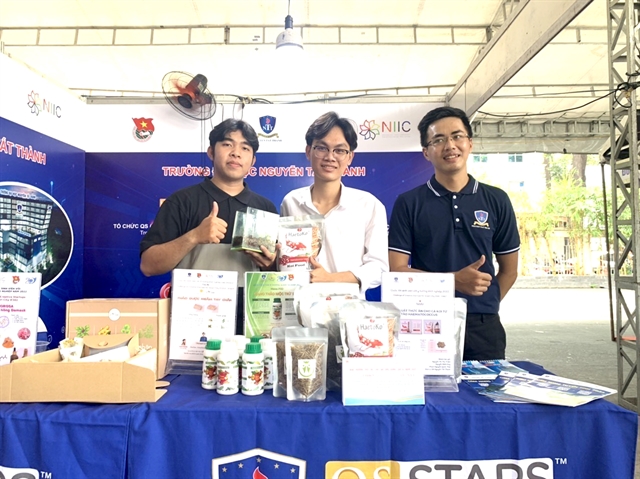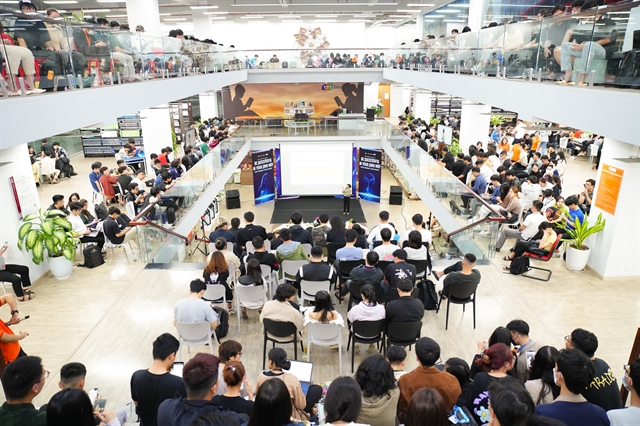 Society
Society

 |
| The Fly Bio team from the Nguyễn Tất Thành University introduces organic products from black soldier flies. — VNA/VNS Photo Lý Thu Hoài |
HCM CITY — In recent years, startup campaigns and contests have taken place to promote the spirit of entrepreneurship among students, and from those contests, many startup projects have been developed.
Realising challenges in agricultural production in Việt Nam, the Fly Bio team - a group of students from Nguyễn Tất Thành University - use black soldier flies to treat agricultural by-products as animal feed.
Applying black soldier flies to agricultural products is not new, but the Fly Bio team is one of the most productive groups today.
The team created a process of raising black soldier fly larvae different from previous conventional farming methods to accelerate larvae development, create clean larvae, reduce odours and create fertiliser which is easy for plants to take.
It takes black soldier flies 45 days to process products, equal to their life cycle.
The group used black soldier flies to treat organic waste, including vegetables or farmers’ unsold products.
They create four products; organic fertiliser for crops, black soldier fly larvae as animal feed, powder to feed Koi fish and hydrolysate as animal feed.
Bạch Công Đoàn, team leader, said that converting organic matter into an energy source for black soldier flies was a very good way to manage organic waste, create organic fertiliser and animal feed to meet the current domestic market demand.
He said that taking advantage of discarded organic matter was an affordable source of fertiliser and animal feed for the people.
Assessing the project, Huỳnh Văn Hiếu, the group's instructor, said that products from black soldier flies were receiving much attention because they had great potential to make food with high protein and fat for the livestock industry.
Along with that, black soldier flies help treat organic wastes, solving the problem of wasting agricultural by-products and environmental pollution from the livestock industry.
Another good project is the Eco House “Solutions for green agriculture”, implemented by the students of the Industrial University of HCM City.
The group's product is a phone device that helps farmers manage and remotely control important garden indicators.
The device is located at the garden house, integrates measurement and controls indicators of temperature, humidity, water and soil nutrients of different crop types.
When there is any abnormality related to the environment, the device will proactively alert the farmer through an application on the phone.
In addition, the application also provides production solutions for farmers based on the conditions of each garden, thereby helping farmers improve efficiency.
Hồ Thanh Huy, the group’s leader, said that the group's further goal was to conduct design consultancy and provide solutions for post-harvest agricultural and biological products.
Thái Duy Tùng, an instructor of the project, said that this was a very practical topic to help farmers cultivate better and contribute to environmental protection, minimising fertilisers and pesticide abuse.
However, the most difficult thing was accessing and competing in the market because the product has no brand name, according to Tùng.
Lacking skills for building brand names and competing in the market is a major difficulty when students start a business. To promote the campaign and have more and more successful startup models, formal training is a requirement for young people today.
Education
 |
| Students join a session sharing experiences related to entrepreneurship at the FPT University. — VNA/VNS Photo Lý Thu Hoài |
Although it has been launched for only three years, technology and innovation have become one of the most famous majors of the University of Economics HCM City.
This is one of the first bachelor's degree programmes in Việt Nam with international-standard entrepreneurship, helping students to have economic knowledge and the ability to apply new technologies such as artificial intelligence (AI), big data, human-computer interaction and innovation.
With an annual target of 100 students, the programme aims to equip knowledge related to business start-up activities and necessary skills for a business owner, such as working independently and in group work, having a professional working style, having a broad vision, problem analysis and synthesis.
Learners will also be able to apply analytical thinking and professional communication skills when conducting business projects, negotiation and leadership skills.
Professor Phan Thị Bích Nguyệt, director of the Innovation Institute under the University of Economics HCM City, said those were necessary for students and young people in general.
They would have enough knowledge and skills to succeed in starting a business, building a sustainable business and innovating, bringing practical value to the community and society.
At FPT University, entrepreneurship has become compulsory for students in all majors for many years.
The curriculum is organised in the form of real-life project experiences and experience exchange from real entrepreneurs.
Phan Gia Hoàng, head of the Entrepreneurship Development major at FPT University, said that to help students be successful in entrepreneurship, formal training was extremely important.
This would help students master the basic knowledge and also help them develop skills, creative thinking and the right direction in the entrepreneurial journey.
Universities would play an important role in creating a positive learning environment that supports students in the entrepreneurial process.
Hoàng said that entrepreneurship training would provide knowledge, create an experiential environment, and provide financial and resource support to help students develop their careers.
It would connect students with investors, businesses and start-up support organisations to help them have more opportunities to develop their projects.
Statistics from the Ministry of Education and Training show that the percentage of universities making entrepreneurship a compulsory or elective subject increased from 30 per cent at the end of 2020 to 48 per cent by the end of last year.
As many as 75 per cent of universities organised short-term training for students through entrepreneurship skills classes.
All of the universities have built programmes to inspire entrepreneurship for students.
According to Professor Nguyệt universities play a very important role in the startup ecosystem.
This is a place to create quality human resources with full knowledge, capacity and skills when participating in the startup ecosystem.
Universities also have an important task of nurturing and supporting innovative start-up ideas, connecting the resources of schools and society to develop successful businesses in the future. — VNS




